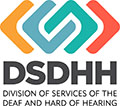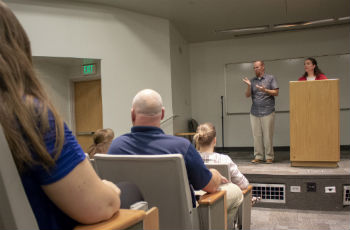- Utah Interpreter Program
-

Certification/Recognition Types
A person wishing to interpret in Utah has several options as it relates to certification and/or recognition. Certifications/recognitions are divided into two types: Entry Level and Advanced.
Utah law states, “an individual is required to be certified as a certified interpreter if that individual provides interpreter services” (Utah Code 35A-13-6). All working interpreters in Utah must have their certification issued or recognized by the Utah Interpreter Program (UIP). Interpreters possessing state of Utah certifications or other certifications (National Association of the Deaf - NAD, Registry of Interpreters for the Deaf - RID, Educational Interpreter Proficiency Assessment - EIPA) determined to be accepted UIP may provide interpreting services in Utah, provided they comply with the requirements for certification and recognition set forth in the policies and procedures of the UIP.
Entry-Level Certifications/Recognitions
An interpreter holding an entry-level certification/recognition must receive an advanced certification/recognition within 4 years. If they do not receive an advanced certification within that timeframe, they will no longer be able to legally interpret in the State of Utah.
Utah Certified Novice Interpreter (UCNI):
This certification has validated entry-level skills, knowledge, and ethical awareness appropriate for communication in a variety of conventional contexts, excluding complex, technical, highly sensitive, or specialized situations.
EIPA 3.5-3.9
Interpreters with Educational Interpreter Performance Assessment (EIPA) scores of 3.5-3.9 demonstrate entry-level skills appropriate for facilitating communication in some K-12 educational settings commensurate with the assessment taken (Elementary or Secondary) and the mode of communication (ASL and PSE). Interpreters who hold only an EIPA recognition are restricted to work in the K-12 educational setting. For more information, visit Classroom Interpreting.

Advanced Certification/Recognitions
All advanced certifications/recognitions may be renewed indefinitely if all renewal requirements are met. No certification qualifies an interpreter to work in every setting/situation. Interpreters should be judicious when accepting work to ensure they are qualified for that assignment.
Utah Certified Deaf Interpreter (UCDI):
This certification has validated skills, knowledge, and ethical awareness appropriate for facilitating communication in an extensive array of contexts, especially those necessitating native linguistic and/or cultural expertise.
Utah Certified Professional Interpreter (UCPI) and Utah Certified Master Interpreter (UCMI):
These certifications have validated skills, knowledge, and ethical awareness appropriate for facilitating communication in an extensive array of contexts, including complex, technical, highly sensitive, or specialized situations.
RID Certifications:
UIP recognizes the following certifications awarded by the Registry of Interpreters for the Deaf (RID).
- All NIC certifications
- CI, CT, SC:L
- CDI
- NAD: IV and V
For more information about the limits and standards for interpreters holding RID credentials, refer to www.RID.org.
EIPA Scores 4.0 or higher:
Interpreters with Educational Interpreter Performance Assessment (EIPA) scores of 4.0 or higher demonstrate skills appropriate for facilitating communication in most K-12 educational settings commensurate with the assessment taken (Elementary or Secondary) and the mode of communication (ASL and PSE). Interpreters who hold only an EIPA recognition are restricted to work in the K-12 educational setting. For more information, visit Classroom Interpreting.
Court Approved:
To be listed as a court-approved interpreter, an interpreter must meet the requirements set forth by the State of Utah Courts and UIP. Only those interpreters listed may work within the Utah court system. An interpreter who is not on the court-approved list and interprets in the court system may be subject to disciplinary proceedings based on an Ethical Practices Review.
For more information, visit How to Become a Court Interpreter and contact UIP at UIP@Utah.gov